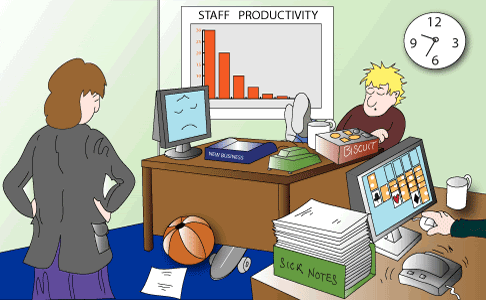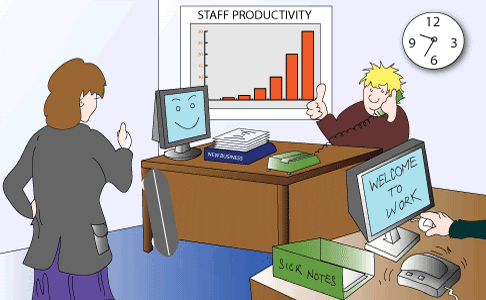An employee's relationship with a line manager might, for them, substitute for their relationship with the whole company. Good line management practices are central to a company's success.
Performance Appraisal skills All managers expected to carry out performance appraisal should have some training. Ideally this should not just include the skills of performance appraisal – the ‘how’ to do it – but also encompass the reasons for performance appraisal, or the ‘why’ the organisation does it. Managers should understand how the process fits...
Preparing for the appraisal meeting Both parties should prepare for the review meeting beforehand if a successful outcome is to be achieved. The appraiser should consider: how well the individual has performed since the last meeting the extent to which any agreed development plans from the last meeting have been implemented the feedback to be...
How do you measure performance? Objectives and performance standards Many organisations set performance objectives or ‘goals’ to be accomplished by individuals, departments and the organisation over a period of time. These can be expressed as targets to be met (such as sales levels) or as tasks to be completed by specified dates. They may be...
Performance management checklist and guidance Performance appraisal (or performance review) is essentially an opportunity for individual employees and those concerned with their performance, typically line managers, to engage in a dialogue about each individual’s performance and development, as well as the support required from the manager. While performance appraisal is an important part of performance...
Establish a rapport Conduct in private and be professional Prepare thoroughly and be clear Outline your concerns over performance A – acknowledge the other persons viewpoint E – expectations outlined I – indicate what you would like to happen now O – outcome discussed and agreed U – understanding and commitment gained Agree review...
Example disciplinary procedure This sample disciplinary procedure is taken from the Acas advisory booklet, Discipline & Grievance at Work which can be found on the Acas website. 1. Purpose and scope This procedure is designed to help and encourage all employees to achieve and maintain standards of conduct, attendance and job performance. The company rules...
Staff Disciplinary Procedures Expending businesses undoubtedly would need spare hands to smooth out the business operations. Small businesses especially those with less than ten people viewed writing up staff disciplinary procedures the least important things to do. The UK employment law suggests all employers to introduce staff disciplinary procedures at work. As employers, you...
Disciplinary procedures: common mistakes made by employers In unfair dismissal claims, employment tribunals (except in Northern Ireland) take the “Acas code of practice on disciplinary and grievance procedures” into account where relevant and may increase an award of compensation by up to 25% for an employer’s unreasonable failure to follow it. Some dismissals can be...
Discipline and grievance issues It is absolutely vital that you follow fair and transparent procedures in disciplinary and grievance matters. If you fail to do so, you could find yourself judged to have dismissed someone unfairly. Good procedures will enable you to stay on the right side of the law and enable you to deal...
Checklist How to hold a disciplinary hearing Gather the facts – the allegation, evidence, and the employee’s past record. Try to resolve the issue informally first. If this does not work, raise the matter formally without delay. Inform the employee in writing, explaining the reason for the hearing and when it will take place; allow...
What do I have to do?
Find the information that suits you best!

